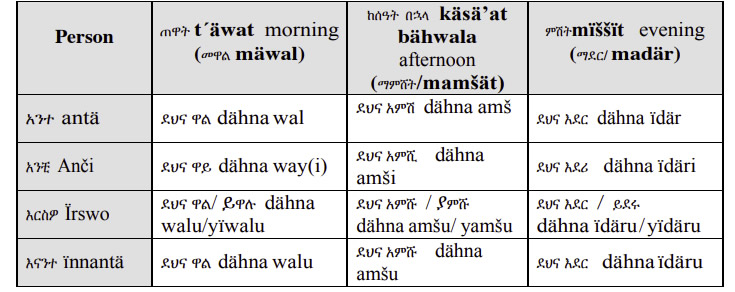Difference between revisions of "Language/Amharic/Vocabulary/Time-Specific-Leave-Taking"
< Language | Amharic | Vocabulary
Jump to navigation
Jump to search
(Created page with "<div style="font-size:300%;"> Time Specific Leave-taking in Amharic </div> ==Practice== ===Responding to Greetings and Leave-Taking. === How would you respond to the foll...") |
|||
| Line 1: | Line 1: | ||
<div style="font-size:300%;"> Time Specific Leave-taking in Amharic </div> | <div style="font-size:300%;"> Time Specific Leave-taking in Amharic </div> | ||
==Leave-taking phrases== | |||
[[File:Amharic-Language-Time-Leave-taking-PolyglotClub.jpg]] | |||
==Practice== | ==Practice== | ||
Revision as of 15:22, 18 September 2021
Time Specific Leave-taking in Amharic
Leave-taking phrases
Practice
Responding to Greetings and Leave-Taking.
How would you respond to the following greetings or leave-takings?
- 1. እንደምን አደርክ/አደርሽ? ïndämïn addärk? / addärš?
- 2. ደህና ናችሁ? dähna naččïhu?
- 3. ደህና እደር / እደሪ dähna ïdär / ïdäri.
- 4. ደህና ሁን / ሁኚ dähna hun / huňi.
Greetings and Leave-Taking Role-Plays
What would you say in each of the following situations?
- 1. You are meeting an elderly person of the community for the first time.
- 2. At a morning meeting, you are asked to come to the front of the room, and greet the entire audience.
- 3. You are speaking to a young, male shopkeeper in the afternoon.
- 4. You are saying goodbye to your LCF at the end of the day.
- 5. You are greeting a female counterpart who has come to visit your house in the afternoon.
- 6. You are going to bed and saying goodnight to your host family.
- 7. You take leave of a group of neighborhood children during the morning
Source
https://www.livelingua.com/peace-corps/Amharic/Amharic%20Peace%20Corps%20Language%20Manual-2015.pdf
